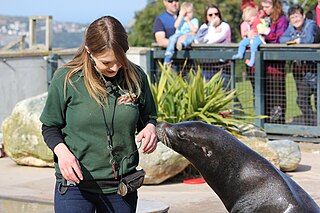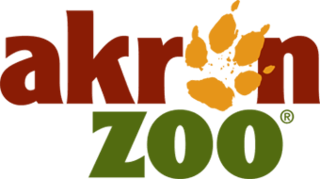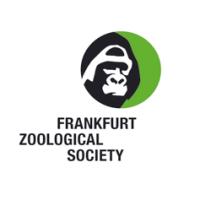
Ex situ conservation is the process of protecting an endangered species, variety or breed, of plant or animal outside its natural habitat. For example, by removing part of the population from a threatened habitat and placing it in a new location, an artificial environment which is similar to the natural habitat of the respective animal and within the care of humans, such as a zoological park or wildlife sanctuary. The degree to which humans control or modify the natural dynamics of the managed population varies widely, and this may include alteration of living environments, reproductive patterns, access to resources, and protection from predation and mortality.

The Association of Zoos and Aquariums (AZA), originally the American Association of Zoological Parks and Aquariums, is an American 501(c)(3) nonprofit organization founded in 1924 and dedicated to the advancement of zoos and public aquariums in the areas of conservation, education, science, and recreation. AZA is headquartered in Silver Spring, Maryland, and accredits zoos. There were 238 accredited facilities as of 2019, primarily in the US, and also a handful in eleven other countries.

The Detroit Zoo is a zoo located in the cities of Huntington Woods and Royal Oak in the U.S. state of Michigan. Spanning 125 acres (50.6 ha), it houses more than 2,000 animals and more than 200 different species. The zoo was the first U.S. zoo to feature bar-less habitats, and is regarded to be an international leader in animal welfare, conservation and sustainability by the Detroit Zoological Society.

The spectacled bear, also known as the South American bear, Andean bear, Andean short-faced bear or mountain bear and locally as jukumari, ukumari (Quechua) or ukuku, is a species of bear native to the Andes Mountains in northern and western South America. It is the only living species of bear native to South America, and the last remaining short-faced bear. Its closest relatives are the extinct Tremarctos floridanus, and the giant short-faced bears, which became extinct at the end of the Pleistocene around 12,000 years ago. Unlike other omnivorous bears, the diet of the spectacled bear is mostly herbivorous. The species is classified as Vulnerable by the IUCN because of habitat loss.

The Wildlife Conservation Society (WCS) is a 501(c)(3) non-governmental organization headquartered at the Bronx Zoo in New York City, that aims to conserve the world's largest wild places in 14 priority regions. Founded in 1895 as the New York Zoological Society (NYZS), the global conservation organization is now led by Interim President and CEO Robb Menzi as of April 2, 2024. WCS manages four New York City wildlife parks in addition to the Bronx Zoo: the Central Park Zoo, New York Aquarium, Prospect Park Zoo and Queens Zoo. Together these parks receive 4 million visitors per year. All of the New York City facilities are accredited by the Association of Zoos and Aquariums (AZA).

Avilon Zoo is a 7.5-hectare (19-acre) zoo located in Barrio San Isidro, Rodriguez, Rizal, Philippines. It is operated by the Avilon Wildlife Conservation Foundation, which also operated the Ark Avilon Zoo in Pasig.

The Indianapolis Zoo is a 64-acre (26 ha) non-profit zoo, public aquarium, and botanical garden in Indianapolis, Indiana, United States. Incorporated in 1944, the Indianapolis Zoological Society established the first zoo at George Washington Park in 1964. The current zoo opened in 1988 at White River State Park near downtown Indianapolis. It is among the largest privately funded zoos in the U.S.

The World Association of Zoos and Aquariums (WAZA) is the "umbrella" organization for the world zoo and aquarium community. Its mission is to provide leadership and support for zoos, aquariums, and partner organizations of the world in animal care and welfare, conservation of biodiversity, environmental education and global sustainability.

A zoo is a facility in which animals are kept within enclosures for public exhibition and often bred for conservation purposes.

Species360 founded in 1974, is an international non-profit organization that maintains an online database of wild animals under human care. As of 2023, the organization serves more than 1,300 zoos, aquariums and zoological associations on six continents and in 102 countries worldwide. The organization provides its members with zoological data collection and management software called ZIMS—the Zoological Information Management System.

San Diego Zoo Wildlife Alliance is a not-for-profit organization headquartered in San Diego that operates the San Diego Zoo and the San Diego Zoo Safari Park. Founded in 1916 as the Zoological Society of San Diego under the leadership of Harry M. Wegeforth, the organization claims the largest zoological society membership in the world, with more than 250,000 member households and 130,000 child memberships, representing more than half a million people. The organization's mission is to save species worldwide by uniting their expertise in animal care and conservation science with their dedication to inspiring passion for nature. The San Diego Zoo and San Diego Zoo Safari Park feature a combined 15,000 animals of 750 species, not all of which are displayed publicly.

The Mulhouse Zoological and Botanical Park is a French zoological park located in the Grand Est region in the departement of Haut-Rhin, in the southeast of the city of Mulhouse, district of Rebberg. Created in 1868 by philanthropists industrialists, led by Charles Thierry-Mieg son, he was successively the property of the Cercle mulhousien, of the Industrial Society of Mulhouse, and then of the City from 1893. It is now managed by the agglomeration community of Mulhouse region, Mulhouse Alsace Agglomération. Its director is, since 2010, the veterinary Brice Lefaux.

Wild Planet Trust, formerly known as the Whitley Wildlife Conservation Trust (WWCT), is a registered charity, set up to run Paignton Zoo after the death of its founder, Herbert Whitley, who established the zoo on his estate at Primley, Paignton in Devon in the 1920s.

The Akron Zoo, officially known as the Akron Zoological Park, is a non-profit zoo located just west of downtown in Akron, Ohio, United States. The zoo sits on 77-acre (31 ha) of which 35-acre (14 ha) are occupied with by habitats, amenities, and support.
SECORE is an international non-profit organization focused on coral reef conservation. The group has over sixty supporters in North America, Europe and Japan, and comprises public aquariums, institutes, and universities. Founded in 2001 at the Rotterdam Zoo in the Netherlands, the organization has been developing methods of captive coral reproduction and preservation, citing studies that have predicted coral reefs could be extinct within decades due to climate change.

The Angkor Centre for Conservation of Biodiversity (ACCB) is a non-governmental organization in Cambodia. ACCB is "one of the first nature conservation and endangered wildlife rescue and breeding centre" in the country. It works towards the conservation of wildlife and biodiversity in Cambodia. Established in 2003 by the German organizations of Allwetterzoo Münster and the Zoological Society for the Conservation of Species and Populations, ACCB's goals include the rehabilitation of confiscated wildlife, breeding of selected species, environmental education, local community involvement, research, and in-situ conservation. Dr. Stephan Goetz from Munich has provided major financial support via Stiftung Artenschutz, a consortium of zoos and nature conservation organizations. The ACCB is a project of the World Association of Zoos and Aquariums.
The Chennai Snake Park, officially the Chennai Snake Park Trust, is a not-for-profit NGO constituted in 1972 by herpetologist Romulus Whitaker and is India's first reptile park. Also known as the Guindy Snake Park, it is located next to the Children's Park in the Guindy National Park campus. Located on the former home of the Madras Crocodile Bank Trust, the park is home to a wide range of snakes such as adders, pythons, vipers, cobras and other reptiles. The park gained statutory recognition as a medium zoo from the Central Zoo Authority in 1995.

The Frankfurt Zoological Society (FZS) is an international conservation organization founded in 1858 with headquarters in Frankfurt am Main, Germany. FZS focuses on maintaining biodiversity and conserving wildlife and ecosystems in protected areas and outstanding wild places. FZS leads and supports about 30 projects in 18 countries. Bernhard Grzimek, renowned German zoo director, zoologist, book author, editor, and animal conservationist in postwar West-Germany, served as president of the Frankfurt Zoological Society for over forty years.

The Bararida Zoological and Botanical Park Also Bararida Zoo Is a park, zoo and botanical garden that is located in the city of Barquisimeto, the capital of Lara State, in the South American country of Venezuela.
















